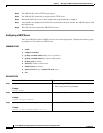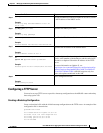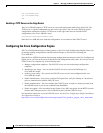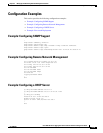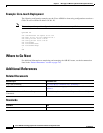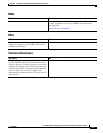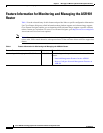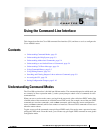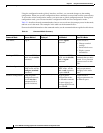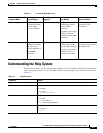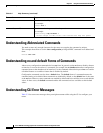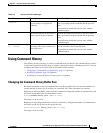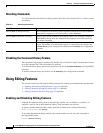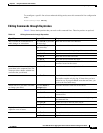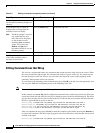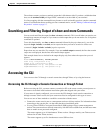
5-2
Cisco ASR 901 Series Aggregation Services Router Software Configuration Guide
OL-23826-09
Chapter 5 Using the Command-Line Interface
Understanding Command Modes
Using the configuration modes (global, interface, and line), you can make changes to the running
configuration. When you save the configuration, these commands are stored and used for router reboots.
To access the various configuration modes, you must start at global configuration mode. From global
configuration mode, you can enter interface configuration mode and line configuration mode.
Table 5-1 describes the main command modes, how to access each one, the prompt you see in that mode,
and how to exit the mode. The examples in the table use the hostname Router.
For more detailed information on the command modes, see the command reference guide for this release.
Table 5-1 Command Mode Summary
Command Mode Access Method
Router Prompt
Displayed Exit Method About This Mode
User EXEC Log in.
Router>
Use the logout
command.
Use this mode to:
• Change terminal
settings.
• Perform basic tests.
• Display system
information.
Privileged EXEC From user EXEC
mode, use the enable
command.
Router#
To go to user EXEC
mode, use the disable,
exit, or logout
command.
Use this mode to verify
commands that you have
entered. Use a password
to protect access to this
mode.
Global configuration From the privileged
EXEC mode, use the
configure terminal
command.
Router (config)#
To go to privileged
EXEC mode, use the
exit or end command,
or press Ctrl-Z.
Use this mode to
configure parameters
that apply to the entire
router.
Interface configuration From the global
configuration mode,
use the interface
command (with a
specific interface).
Router (config-if)#
To go to global
configuration mode,
use the exit command.
To return directly to
privileged EXEC mode,
press Ctrl-Z.
Use this mode to
configure parameters for
the Ethernet ports.



